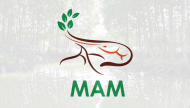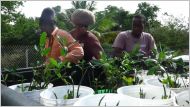IKI and the protection of the ocean

8 June is World Oceans Day! We show why the protection of the oceans is so important and what IKI is doing to help achieve this.
Oceans – the origin of all life. Most of the oxygen we breathe is produced in the sea, 75 percent of all humans live near the coast, and around 70 percent of the earth’s surface is covered by water. Water is nature’s driving force – and it is absolutely vital for all of us.
8 June is World Oceans Day
In order to raise public awareness of the importance of the oceans and their protection, the 1992 World Climate Summit in Rio de Janeiro, Brazil saw the inauguration of the World Oceans Day, which has since been accompanied by thousands of events all over the worlds every year.

The well-being of humanity depends to a large extent on the condition of the oceans and their ecosystems and the coastal ecosystems of the tropics play a particularly important, global role. Coral reefs, seagrass meadows and mangrove forests play host to an enormous treasure trove of plant and animal species – a biological diversity, which makes a decisive contribution to global nutrition, the climate, carbon storage and natural coastal protection. However, man is the main cause of the continuous loss of these marine resources, the destruction of coastal ecosystems and the pollution and deterioration of water quality.
 Today, 50 percent of all coral reefs and mangrove forests and 25 percent of all seagrass meadows have been lost – and the other 50 percent of the world’s reefs are already severely damaged and endangered. About 75 percent of fish stocks have been overfished and 33 percent of all marine mammals are currently threatened with extinction (see IPBES Report 2019). Global climate change exacerbates these problems by leading to the mass death of ecosystems. One example of this is coral bleaching: it is caused by the rise in sea temperature and other stress factors. The animal coral polyps lose their symbiotic algae and this disturbs the biological community to such an extent that the corals are often unable to absorb food – and the coral colonies usually die off. The last major mass death took place in 2016–2017 in the Great Barrier Reef in Australia.
Today, 50 percent of all coral reefs and mangrove forests and 25 percent of all seagrass meadows have been lost – and the other 50 percent of the world’s reefs are already severely damaged and endangered. About 75 percent of fish stocks have been overfished and 33 percent of all marine mammals are currently threatened with extinction (see IPBES Report 2019). Global climate change exacerbates these problems by leading to the mass death of ecosystems. One example of this is coral bleaching: it is caused by the rise in sea temperature and other stress factors. The animal coral polyps lose their symbiotic algae and this disturbs the biological community to such an extent that the corals are often unable to absorb food – and the coral colonies usually die off. The last major mass death took place in 2016–2017 in the Great Barrier Reef in Australia.
How does the Ministry of the Environment promote marine and coastal protection?
Against this background, the Federal Ministry for the Environment, Nature Conservation and Nuclear Safety (BMU) is also committed to marine and coastal protection as part of its International Climate Initiative (IKI). In developing and transition countries, it supports projects that work worldwide at the interface between biodiversity and climate protection. These projects are aimed at making the use of coastal and marine resources more sustainable, restoring natural ecosystems and, in particular, enabling coastal communities to maintain their livelihoods. Since IKI was established in 2008, BMU has put more than €200 million into funding almost 50 projects which earlier were and are today active in various thematic areas.
In the four current IKI funding areas, marine and coastal protection projects are mainly implemented in the areas of biodiversity (48 percent) and adaptation (43 percent). The majority of the projects are located in Asia and in Central & Latin America.
 In terms of content, the IKI focus is on 30 marine and coastal projects with a funding volume of almost €140 million for the protection and restoration of mangroves, such as the project ‘Expansion of Mangroves-EbA in the Mekong Delta’, in which adaptation measures and coastal protection measures are carried out (EbA = Ecosystem- based Adaptation). For example, sustainability certificates are awarded for shrimp farming, provided that no mangroves are cleared for this purpose and that their protection is promoted by a mangrove-polyculture as a climate-friendly livelihood.
In terms of content, the IKI focus is on 30 marine and coastal projects with a funding volume of almost €140 million for the protection and restoration of mangroves, such as the project ‘Expansion of Mangroves-EbA in the Mekong Delta’, in which adaptation measures and coastal protection measures are carried out (EbA = Ecosystem- based Adaptation). For example, sustainability certificates are awarded for shrimp farming, provided that no mangroves are cleared for this purpose and that their protection is promoted by a mangrove-polyculture as a climate-friendly livelihood.
 However, the sustainable use and protection of coral reefs is also extremely significant in IKI project funding. The sustainable and traditional use of coral reef resources for fishing is particularly addressed, but the networking of protected areas and regional approaches was also taken into account in the projects ‘Development of a resilient and effectively-managed network for the marine protected areas in the ecoregion ‘Lesser Sunda Islands’ and ‘Network of climate-resistant marine protected zones in the Eastern Caribbean (ECMMAN)’.
However, the sustainable use and protection of coral reefs is also extremely significant in IKI project funding. The sustainable and traditional use of coral reef resources for fishing is particularly addressed, but the networking of protected areas and regional approaches was also taken into account in the projects ‘Development of a resilient and effectively-managed network for the marine protected areas in the ecoregion ‘Lesser Sunda Islands’ and ‘Network of climate-resistant marine protected zones in the Eastern Caribbean (ECMMAN)’.
It is essential to learn from local and traditional knowledge and to apply and expand successful approaches. IKI must therefore carry out projects in joint efforts with indigenous coastal communities, to promote and respect local ownership and to ensure the widest possible transfer of knowledge among the various interest groups. The project ‘Capacity Building for Enhanced Coastal and Marine Management in West Africa (Mami Wata Project)’ thus targets traditional utilisation approaches within the framework of the Abidjan Convention (The Convention for Cooperation in the Protection, Management and Development of the Marine and Coastal Environment of the Atlantic Coast of the West, Central and Southern Africa Region). Similarly, the ‘Dissemination of innovative and community-based measures to protect biodiversity on the coasts of Indonesia, the Philippines and in the Pacific’ project also supports and disseminates local approaches through pride campaigns and knowledge transfer.
The project ‘Capacity Building for Enhanced Coastal and Marine Management in West Africa (Mami Wata Project)’ thus targets traditional utilisation approaches within the framework of the Abidjan Convention (The Convention for Cooperation in the Protection, Management and Development of the Marine and Coastal Environment of the Atlantic Coast of the West, Central and Southern Africa Region). Similarly, the ‘Dissemination of innovative and community-based measures to protect biodiversity on the coasts of Indonesia, the Philippines and in the Pacific’ project also supports and disseminates local approaches through pride campaigns and knowledge transfer.
Moreover, IKI promotes integrative management approaches that are designed across regions and in which the interaction between land and sea is taken into account. Such projects contribute to the protection and conservation of the ecosystems as a whole.

In the ‘Protection and Integrated Management of Marine and Coastal Biodiversity’ project, measures to reduce negative impacts are implemented, not only in the marine protected areas but also on land. These impacts can be caused by water pollution from agriculture or by the degradation of various areas, both of which lead to the increased removal of sediments, which in turn are channelled into the oceans via rivers.
While coastal ecosystems within a 200-mile zone are subject to the national legislation of the individual countries, the sustainable use and protection of the high seas in non-territorial waters is a much more difficult issue – but it is nevertheless an absolutely crucial topic. Tackling this requires agreements and negotiations that are founded on common global beliefs. The ‘Strengthening the High Seas through Regional Governance’ project makes a targeted contribution here by introducing comprehensive, cross-sectoral approaches to the conservation and sustainable use of biological diversity on the high seas (areas beyond national jurisdiction - ABNJ) and by instigating marine governance approaches at political and legal levels, e.g. within the United Nations Convention on the Law of the Sea (UNCLOS).

With the presentation of these more detailed projects and many others, IKI is thus involved at local, regional and global levels and with various thematic focal points together with the local people, with the joint goal of preserving the oceans and their comprehensive ecosystems for the future.
The link has been copied to the clipboard
Contact
IKI Office
Zukunft – Umwelt – Gesellschaft (ZUG) gGmbH
Stresemannstraße 69-71
10963 Berlin
Related Videos
Related Publications
-
 05/ 2022 | IKI Evaluation
05/ 2022 | IKI EvaluationScaling up mangrove EbA in the Mekong Delta
German with executive summary in English (PDF, 1 MB)









![[Translate to English:] Walhai](/legacy/_processed_/d/4/csm_20210608_Walhai_Miguel_Schmitter_0106af1a48.jpg)

![[Translate to English:]](/legacy/_processed_/5/5/csm_Indien_EE_Solar_Frau_bfcf99c425.jpg)





